Our Blog
Cryotherapy available at ZimmVet for treatment of small Masses
By Dr. Maria Krenz, DVM – ZimmVet-763-856-4848
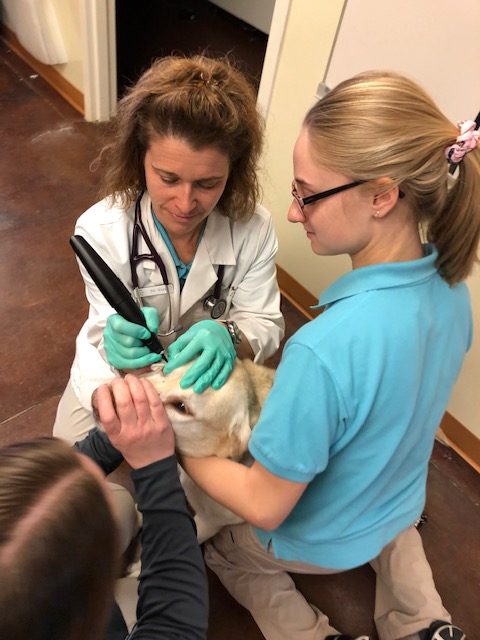
Benefits of Cryotherapy
Cryotherapy is a treatment that has been around for years in both the human medical field as well as veterinary care to treat masses, skin lesions, skid tags, eye tumors and more. In recent times, the technology has become more precise and easier to use in the veterinary industry.
What is Cryotherapy
Cryotherapy is a procedure that uses extreme cold to destroy tissue. The process is called cryo-necrosis, or tissue destruction by freezing. Cryotherapy freezing is set to -80 degrees Fahrenheit to destroy the cells. Nitrous oxide is the active ingredient used in cryotherapy, instead of liquid nitrogen, which is what most people are familiar with. Liquid nitrogen is not used because the temperature achieved is lower that nitrous oxide and results are not as precise. Modern day Cryotherapy tools with nitrous oxide look like a large pen and can apply the cooling effect very precisely.
Continue…Picking the Best Pet for You
By: Angela Mose, ZimmVet Daycare Staff
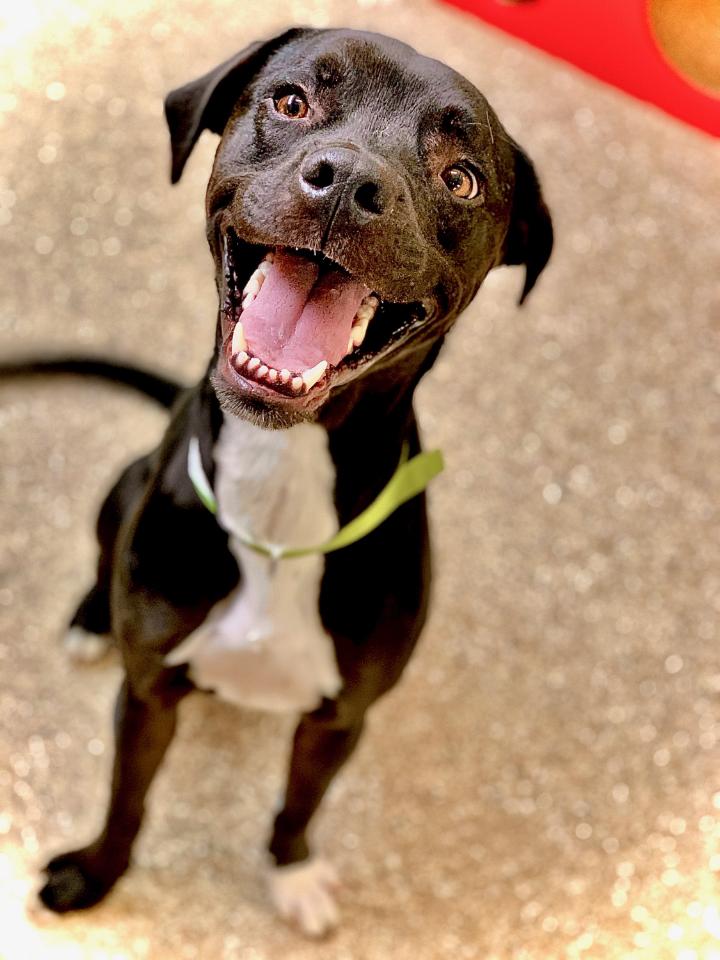
Nothing is as exciting as bringing home a new fur baby! In order to assure that your new family member gets off to the best start, it’s important to consider a few questions. Taking the time to carefully choose your new companion will enable all of you to fall in love at first sight.
What Are Your Expectations?
When adding a pet, it’s helpful to picture how that pet will fit into your family. Are you looking for a hiking buddy, guard dog or a couch pal? This will help you narrow your search. If you are looking for a companion to go on outdoor adventures with, selecting a breed or a mix with athletic tendencies will ensure that Fido won’t poop out on that 4-mile hike.
On the other hand, if you are wanting a companion to binge-watch the latest Netflix show, then selecting a dog breed that prefers being a homebody might be a perfect couch cuddler. You may find that a caged pet will be ideal for your family. If no one is home for long periods of time, then a calmer cat or a small furry pet may give you the companionship you want with the flexibility to accommodate a busy schedule.
Continue…Snuffle Mat Fun
By: Valerie Ferguson, ZimmVet
Let’s face it, Minnesota winters can get LONG. I am always looking for new ways to add mental stimulation to my pets’ lives when it is too cold to spend a lot of time outdoors. Mental stimulation is often found through exercising their minds and through performing nose work, such as sniffing out hidden treats.
My dogs really enjoy trying to find treats and cheerios that I have hidden in the snuffle mat that I made for them.
What you will need to make your own snuffle mat:
A rubber anti-fatigue mat with holes in it

Fleece fabric cut into strips approximately 7 to 8” long and varying widths ranging from 1 to 2” wide. You can use any colors and mix and match to customize it to your liking.
Once you have your mat and the fleece fabric strips are cut all you have to do is string the strips through the holes and tie them – the fuller the mat the better it is to hide treats in J
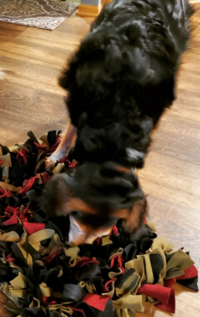
This is a photo of my dog, Bear sniffing out Cheerios that I hid in his snuffle mat
Benefits of Therapeutic Laser
Benefits of Therapeutic LaserBy Dr. Maria Krenz, DVM – ZimmVet-763-856-4848
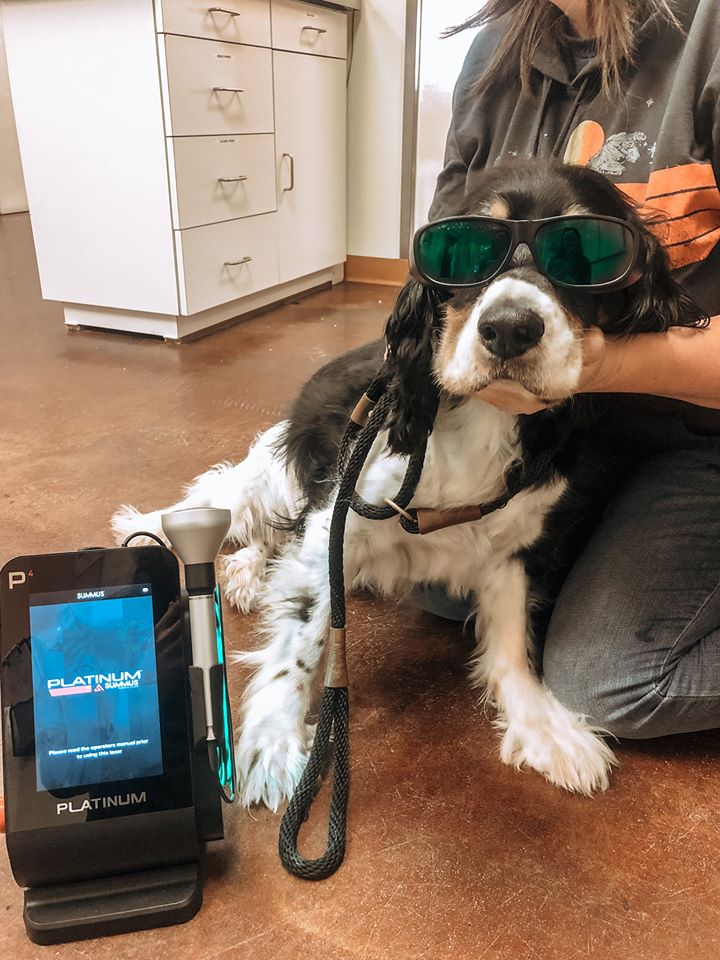
Pets are living longer, happier lives as a result of routine preventative care and advancements in medical technology. Laser therapy is another tool for treating and managing a wide variety of conditions in pets.
The History of Laser
The therapeutic laser was developed in 1960 with documented use in pets in 1967. In the 1970s, it was accepted as a physical therapy modality. As more studies have been carried out, interest in therapeutic laser for treating various conditions has grown dramatically. Therapeutic laser can be used in conjunction with, or instead of medication to manage pain, inflammation and wound healing. This is similar to acupuncture, massage therapy, and other alternative therapies.
Technology Behind Laser
Therapeutic lasers use light waves of a specific wavelength to cause photobiomodulation, or the alteration of cellular and tissue physiology. Light absorbed by cellular components stimulates electrons and activates cells to promote growth, proliferation, migration, and repair.
Laser therapy helps tissue repair by causing the following:
- Endorphin release
- Vasodilation, which increases blood flow to bring in oxygen and cells involved in the healing process
- Muscle relaxation
- Decreased inflammation
- Faster healing and repair
The main clinical benefits of laser use in pets include decreased inflammation, decreased pain, and improved wound healing.
Continue…Ways to Challenge and Engage your Dog
By: Lena Hansen ZimmVet Daycare
Zimmvet offers retail items that are not only fun and exciting, but also mentally stimulating for your dog. These are great options to use with your dog at home, or to bring with them when they stay in ZimmVet’s hotel.
Fun Feeder
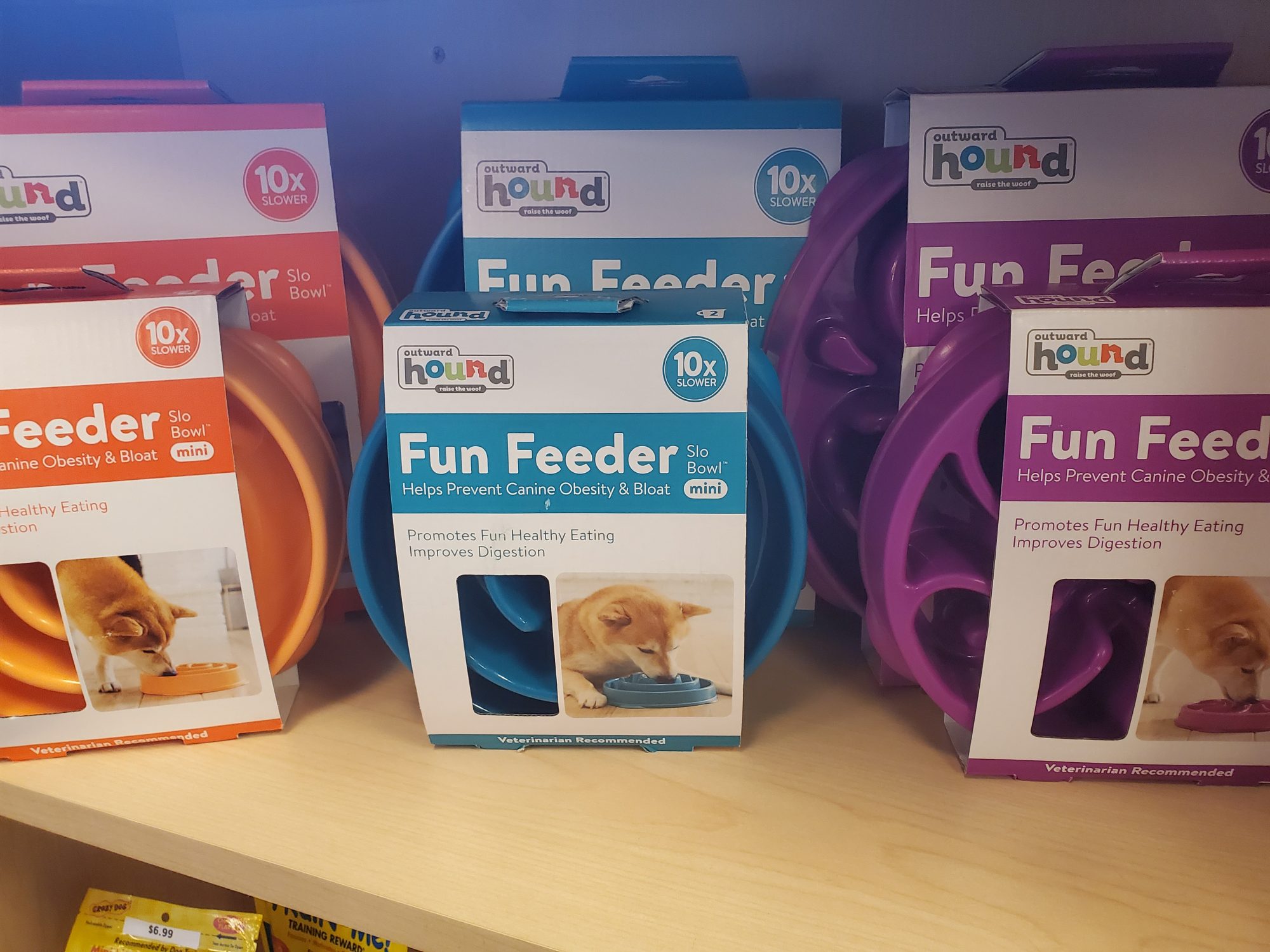
Get your dog an Outward Hound Fun Feeder. They come in many different colors and sizes and are perfect for those speedy-eaters. Not only will your puppy learn to take his time while eating his dinner, but adult dogs will too enjoy finding kibble in every part of the maze. We all know our pups love feeding time but now meals can be even more enjoyable. Along with health benefits such as preventing regurgitation and bloat, the Fun Feeders we offer at ZimmVet will help engage your dog and allow him to practice self-control.
Kong Toys
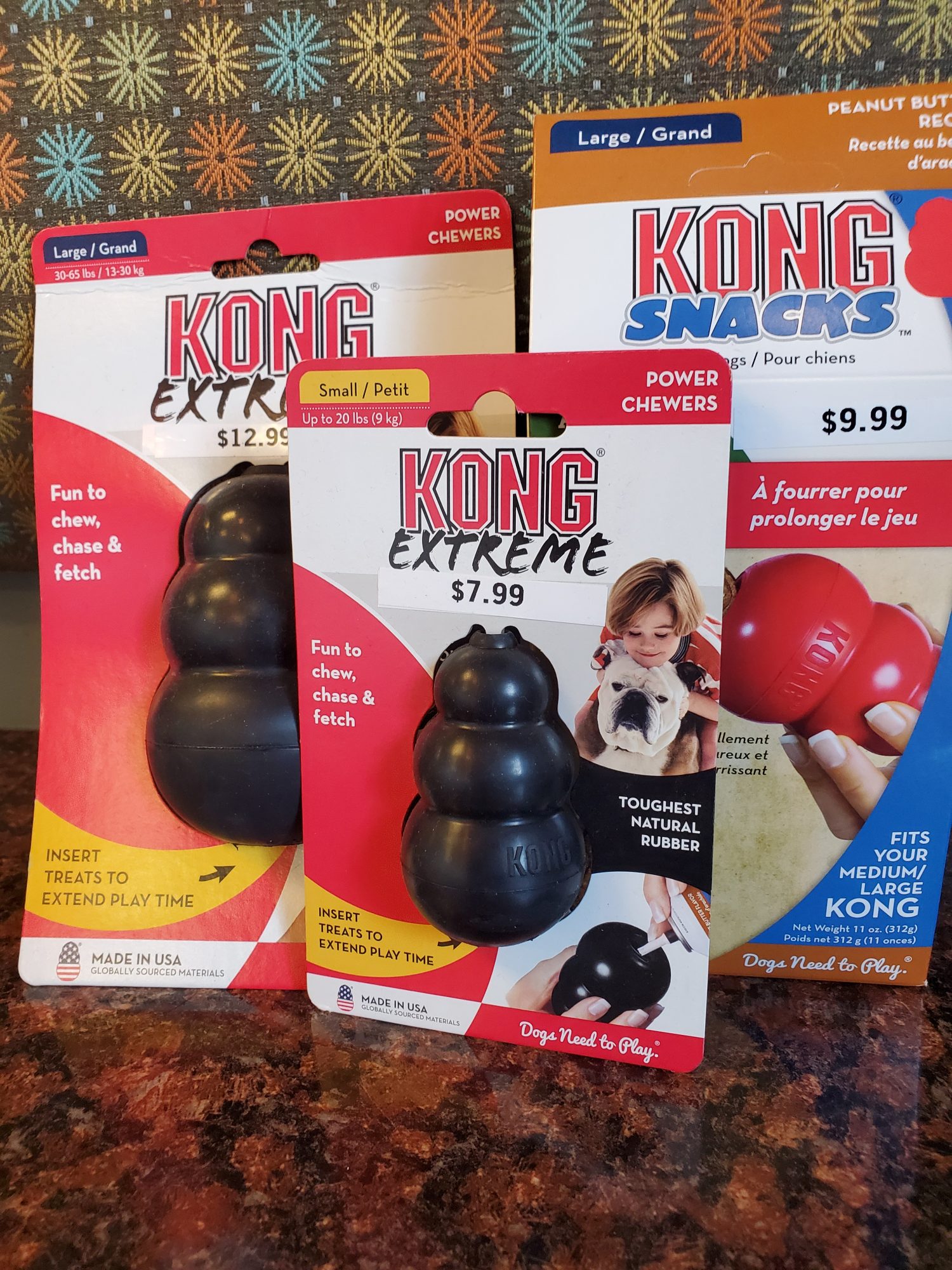
We offer a variety of Kong toys at ZimmVet. Not only do we use them for play in our daycare program, but we also sell them in our lobby. Kong makes many different toys for the dogs that love to chew. Our personal favorite is the Kong stuffer, that can hold treats or peanut butter inside and act as a puzzle. The daycare kids love to stay busy with one of these during their breaks from play. It is also beneficial for hotel dogs who experience stress and anxiety in their kennel during long stays. Kongs will keep your dog busy and motivated to reach the treats and therefore make his overnight stay a more relaxing experience.
Puzzle Toys
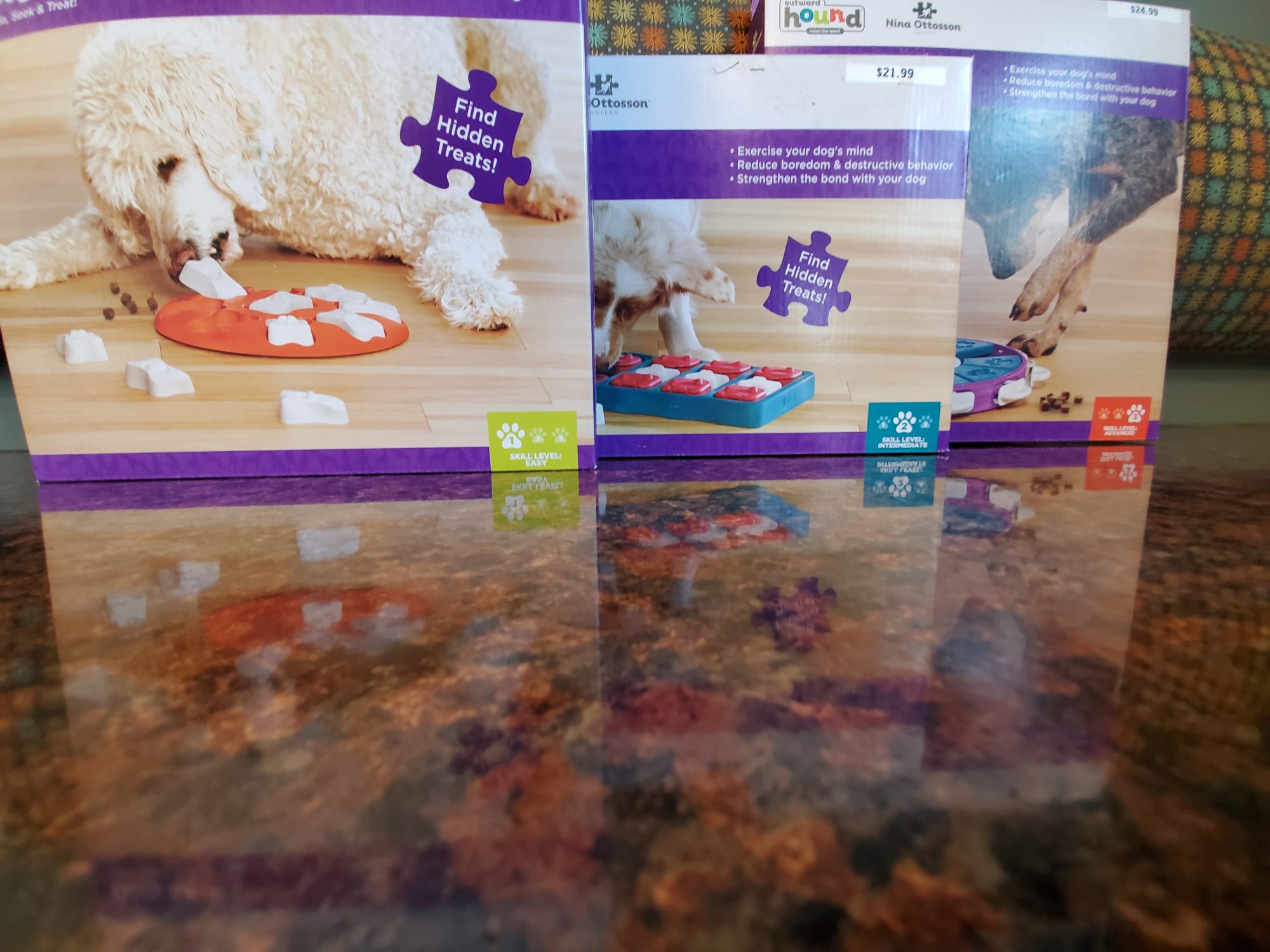
Normally we think of fetch and tug-of-war as exciting games to engage our energetic pooch. But did you know that mental stimulation is just as important as physical stimulation? ZimmVet offers three different types of puzzle toys that will get your pooch’s brain in gear. Ranging from beginner’s level to a more advanced version, puzzle toys are a great way to engage your dog at home or while they are here in the hotel.
Next time you stop in for services with your dog make sure to check out the different varieties of engaging toys we have in the lobby.
Training Talk: Bringing Home a New Puppy
By Darian Smock Trainer at ZimmVet 763-856-4848
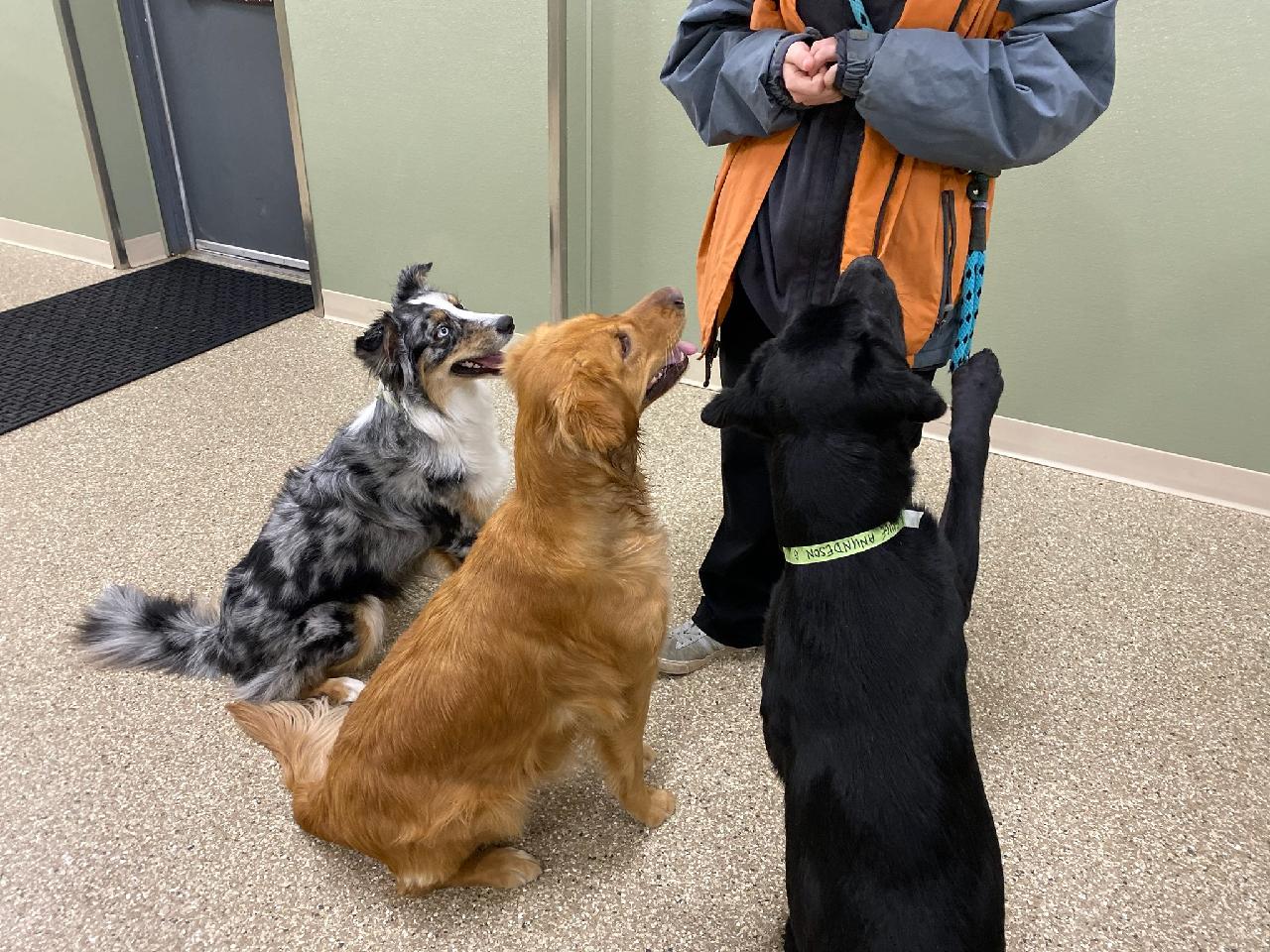
Many families chose the holiday season to add a pet to their households. Bringing home a new puppy can be a fun and exciting time for the whole family, but also filled with new experiences and challenges. A puppy goes through lots of sudden changes when coming into your home. Here are a few tips and tricks to help make the transition go as smoothly as possible!
- Ask for a comfort item from the breeder or rescue. A toy or blanket with familiar scents (such as mom or littermates) will help soothe the puppy.
- Keep them busy. A busy puppy is a happy puppy. Have a variety of toys and vet approved chews to keep their minds occupied and not worrying.
- Get a Kennel. Giving your new family member their own “safe space” allows them to rest comfortably when feeling insecure or overwhelmed. Starting kennel training early will also help curb separation anxiety.
- Start a routine right away. Dogs are creatures of habit. Putting your puppy on a regular schedule for feedings, potty trips, and kennel time will help them know what to expect.
- Sign up for Training classes. Until we teach our new puppies the household rules, they are guessing and pushing boundaries. Getting them signed up for obedience classes will help you set up the standard of expectation for their behavior from the beginning and prevents having to go back and fix bad habits as an adult.
Always feel free to contact the training department here at ZimmVet at 763-856-4848 or training@ZimmVet.com for more helpful tips on bringing home a new puppy or to ask about our upcoming puppy kindergarten classes.
Importance of Starting Grooming at a Young Age
By: Michaela Tallant ZimmVet Professional Groomer

When puppies began to explore and age they go through different developmental stages. Starting from the moment you bring your puppy home at 8 weeks, your puppy is learning and pushing boundaries. This is the prime time to start training, socializing and, desensitizing.
Some breeds of dogs need grooming on a regular schedule. It is critical that you begin desensitizing them to the grooming process. This will help make the experience enjoyable for them and fear-free.
Here are some great Training and Desensitizing techniques that you can start with at home!
Continue…Winter Tips For Your Pet
By Dr. Abby Soderberg, DVM – ZimmVet-763-856-4848
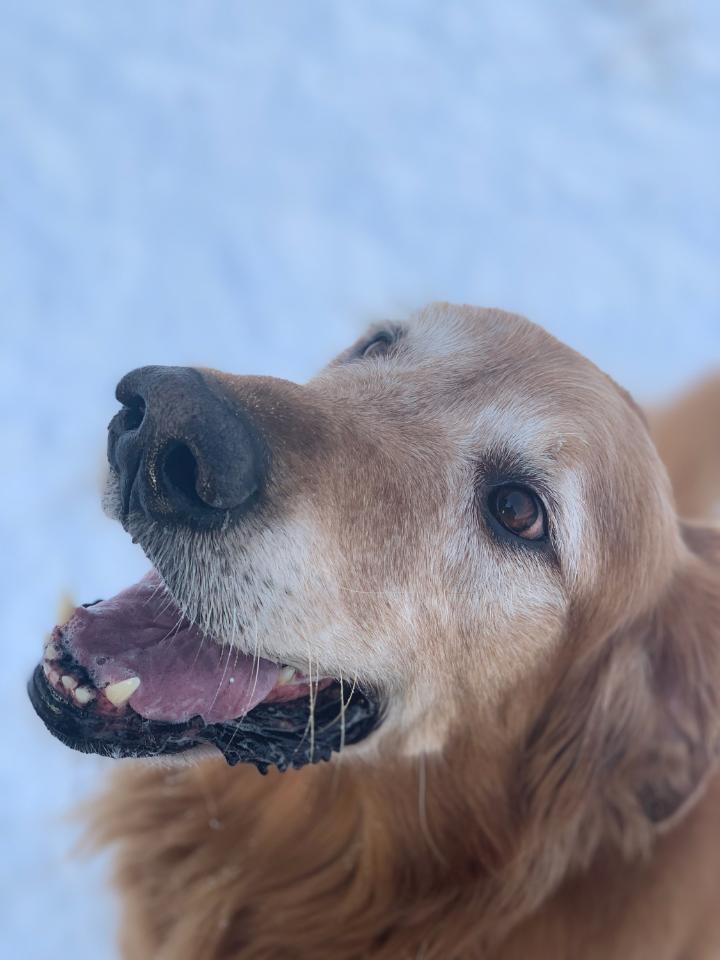
The winter season and -20 below wind chill is fast approaching. Here are some ideas to keep your pets safe this cold winter season:
- Some dogs are more susceptible to the cold than others. Short-coated, thin, sick, elderly, or very young dogs can get cold more quickly so adjust the amount of time they spend outside.
- Just like in humans, any temperature below 32 degrees Fahrenheit can cause frostbite in our pets. If it’s too cold outside for you it’s too cold outside for your pets.
- If your pet allows clothing, bundling them up before going outside can help prevent hypothermia.
- For pets that do not tolerate boots on their paws you can apply Vaseline or Musher’s Secret to provide an invisible barrier between your dog’s paws and the environment.
- When walking your dog, keep yourself and your dog safe by wearing reflective gear (clothing, leash, collar, etc) and keeping your dog close when walking on the street. Avoid walking your dog on frozen lakes and ponds. Your dog could be seriously hurt if the ice breaks.
- Only take your pets in the car if it is necessary and never leave them unattended as cold cars are just as dangerous as hot cars in the summer.
- Keep your dog’s paw hair trimmed short to prevent snow and ice accumulation
- Clean your dog’s feet after they come in from outside to remove any trapped ice, snow, or toxic chemicals such as de-icers or antifreeze and prevent them from licking it off and becoming sick. When wiping off your dog’s paws, remember to check for signs of injury, such as cracked or bleeding paws.
- Purchase pet-safe de-icers for an extra level of safety.
- Be cautious with anti-freeze as this chemical is toxic to dogs. Antifreeze attracts cats and dogs because it is very sweet to taste, but it is extremely poisonous and can cause serious illness or death when ingested. Be sure to clean up any antifreeze that spills in your garage, and keep the bottle somewhere your pets cannot access.
- Cats often sleep in the wheel wells of cars during the winter months to keep warm. Look in your wheel wells or honk your car horn before starting your car to prevent serious injuries.
- Our pets are usually less active in the winter months and are more prone to gaining extra un-necessary weight during this time. Talk to your local veterinarian if you would like their help in calculating a winter diet.
Disclaimer: This written content is meant to be educational and is not medical advice. Always consult a veterinarian about medical advice for your pet.
Lost and Found Pet Resources
By: Valerie Ferguson ZimmVet Receptionist
If you have ever lost or found a pet you may have stopped and asked yourself, “What do I do next?”
If you ever find yourself in this situation, here are some tips to assist in finding your pet or locating the rightful owner of the pet that you have found.
If you have lost your pet, the following steps may be helpful in their safe and timely return:
- Search your house, yard and surrounding areas while calling your pet by name and using exciting words that your pet likes to hear such as “treat” or “go for a ride”
- Leave your pets’ bedding, crate or your clothing with your scent on it by the location that your pet left from (blankets, pillowcases, clothing and pet beds work well)
- Leave food and water out for them
- If practical, leave doors open to the house, especially doors that your pet is used to using
- Recruit neighbors, friends and family to assist in search efforts by car, foot, bike or by making phone calls to local veterinary clinics, shelters, rescues, law enforcement and posting on social media groups
- If you have another pet in your home it may be helpful to take them with you while searching for your lost pet
- Carry your pets’ leash, treats and a photo of your dog to show people that you encounter during your search
TIPS:
- Large brightly colored signs are helpful in the area where the pet was last seen
- When searching by car, drive with your flashers on and have a sign in the window that says “Lost Dog” or “Lost Cat”
The Value of Starting Obedience Classes Early
By: Darian Smock, ZimmVet Pet Trainer
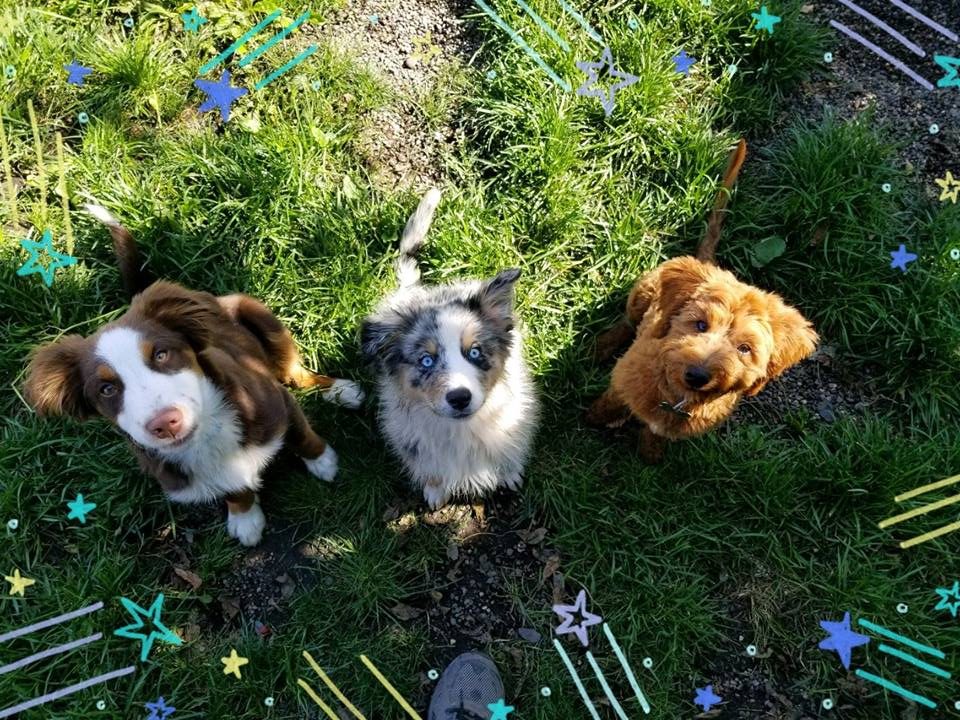
Here at ZimmVet’s Training Department, we know that behavioral issues are the number one reason pets are surrendered to shelters. Taking your new puppy or dog to obedience classes shortly after they come home with you can help prevent the formation of bad habits and unacceptable behaviors. It also helps your dog understand your standard of expectation for your household rules. This helps set them up for success as they transition into your family because they aren’t guessing or having to push boundaries to know what the rules are.
There is a common misconception that dogs and puppies need a long time to “settle in” to their new home. This is untrue and can actually be detrimental as it doesn’t give your new pet a clear set of rules and boundaries to follow. A new puppy or dog will be more comfortable and happier when they are able to know exactly what is okay and not okay. It is recommended to stat a group class with a new pet within 4 weeks of bringing them home.
Our Puppy Kindergarten and Obedience 1 classes are positive reinforcement style group training classes that are designed to help build the relationship between you and your dog while giving you the tools to shape a pleasant companion at home. Starting obedience classes early will help ensure that you’re not going back a year later fixing bad habits, and it’s a great way to start off your relationship with your new best friend on the right foot!


